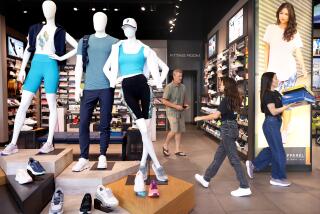COMMENTARY : How Do We Stop ‘Sneaker Killings’?
- Share via
Michael Jordan grew up middle-class, in a small town in North Carolina. He grew up with parents who loved him, nurtured him. Parents who stayed married.
Even when he became an NBA superstar and began reaping millions of dollars annually after signing with Nike, it never dawned on him that inner-city youths would rob and murder each other over the shoes he endorsed.
But that’s what’s happening today in America’s inner cities. And it happens not just to wearers of Air Jordans, it happens to wearers of many types of sneakers, jackets and Major League Baseball caps worn and endorsed by pro stars and their teams.
It happens because sneakers are macho status symbols, and the shoe companies spend more than $200 million a year on seductive advertising aimed at impressionable kids.
It happens because the top-of-the-line shoes are so expensive -- Reebok’s “Pump” retails for $170, Nike Air Jordans for $115 -- that for some poor, desperate, directionless inner-city kids, the only way to get them seems to be through drug money or mugging.
It happens because gangs, on whatever whim, often identify themselves by a certain brand of sneaker, jacket, cap. Rival gangs will kill you on sight for wearing those clothes, even if you’re a non-gang member totally unaware of their significance.
It happens because we live in a warped society that pays lip service to our concern for our fellow man, yet has done little to prevent the establishment of a permanent underclass in inner cities and isolated rural pockets, islands of misery where kids without love, adult guidance, money or hope are bombarded and influenced by the same glitzy TV programs and commercials that feed every viewer, regardless of purchasing power, a steady diet of flash and dash, status and luxury. Not having the money to buy something doesn’t lessen a person’s appetite for it. It just makes the craving stronger.
But these sneaker killings, for want of a better term, have little to do with money, just status. Sneaker advertisers, ignoring the fact that more than 80 percent of sneakers purchased in this country are not used for sport, claim that their commercials have to do with sports, not status. They say they are appalled that kids kill each other over their product.
But some people who run sporting goods stores, especially in the inner city, say that carrying certain brands attracts gangs. And that some of their best customers make their purchases with drug money. And that any shoe company spokesperson who claims not to know that drug money is fueling this $5.5 billion domestic industry (1990 projection for U.S. sales) has his head in the sand.
How can the proprietor tell what’s drug money and what isn’t? If a kid comes in with a 3-inch wad of bills, buys 30 pairs of sneakers in 10 minutes and pays without waiting for change, you can be fairly certain he’s not outfitting the local Little League.
In its May 14 cover story, “Your Sneakers Or Your Life,” Sports Illustrated reported that Wally Grigo, who owns three sportswear shops in and around New Haven, Conn., put a sign in his window last August that read: “If you deal drugs, we don’t want your business. Spend your money somewhere else.” Grigo told SI he figured putting up the sign has cost him $2,000 a week in drug money sales.
Who’s at fault? What can be done to stop the horror of a human life being snuffed out for a pair of shoes? Failing that, what small steps can be taken to lessen its frequency? This has been a hot topic of conversation among sports writers in almost every press room I’ve visited the last two months.
At first, our discussions centered on the advertising superstar, Jordan. As perhaps the most popular sports hero in our nation, a man who takes pride in being a role model for youth, a man who makes millions of dollars a year from Nike, should he take a moral stand and tell the shoe company he will only endorse a much cheaper model of the shoe? Should he make a public service announcement telling drug dealers: “Don’t buy my shoes”? Should he stop endorsing the product?
Jordan is greatly disturbed by the sneaker killings, and by being linked to them, however insanely and indirectly, because he represents Nike. And, yes, he could do one or all of the above things, and some people -- me included -- would lionize him.
But why should a black athlete like Jordan be held to a higher standard than a white athlete? That’s racist. You can make a case that John McEnroe’s spoiled brat behavior on the tennis court was a bad example for a generation of young players. But Jordan is a shining example. Neither he nor any athlete-endorser has anything to do with kids killing each other over sneakers, jackets or caps.
Besides, sometimes, there is no rhyme or reason to what shoes or sporting equipment are “hot.” SI interviewed one manager of a Chicago Foot Locker Store whose hottest shoe was a $39 brand that he said had been around for 20 years. Who can predict fashion fads?
More to Read
Go beyond the scoreboard
Get the latest on L.A.'s teams in the daily Sports Report newsletter.
You may occasionally receive promotional content from the Los Angeles Times.










